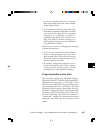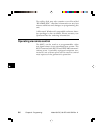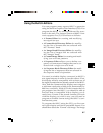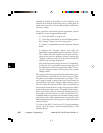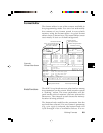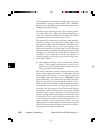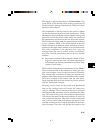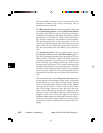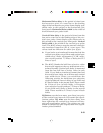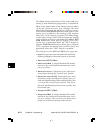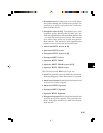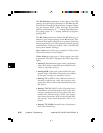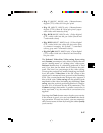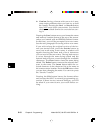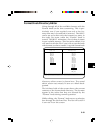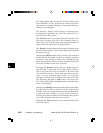
6-13
Horizontal Pulse delay is the period of time from
the last active pixel in a scan line to the leading
edge of the horizontal sync pulse. Some display spec
sheets refer to this period as the horizontal sync
front porch. Horizontal Pulse width is the width of
the horizontal sync pulse itself.
Vertical Pulse delay is the period of time from the
last active scan line to the leading edge of the ver-
tical sync pulse. Some display spec sheets refer to
this period as the vertical sync front porch. Vertical
Pulse width is the width of the vertical sync pulse
itself. The 801G* always uses the entered values for
non-interlaced American (E.I.A.) sync types. The
values used are different for other sync types:
❖ If you had a non-interlaced format that had the
vertical sync delay set to 8 lines and vertical sync
width set to 3 lines, a European (C.C.I.R.) selec-
tion would produce 7.5 lines of delay and 2.5
lines of sync.
❖ The 801G* blanks the half lines of active video
that would appear at the top and bottom of in-
terlaced formats. Vertical sync delay is measured
from the last full line of active video in each
field. If you had an interlaced format that had
the vertical sync delay set to 8 lines and vertical
sync width set to 3 lines, you would have the
following results: An American sync selection
would produce 8 lines of delay in one field and
8.5 lines of delay in the second field. There would
be 3 lines of sync in both fields. A European
sync selection would produce 7.5 lines of delay
in one field and 8 lines of delay in the second
field. There would be 2.5 lines of sync in both
fields.
EQ Before sets the how many scan lines just prior
to the vertical sync interval will contain pre-equal-
ization pulses. EQ After sets the how many scan
lines right after the vertical sync interval will con-
tain pre-equalization pulses. The pulses are only
added to composite sync outputs that have equal-
ization pulses enabled.



